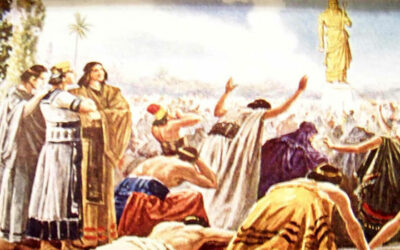“Yes, I am the Door. Anyone who goes in and out through Me will be safe, and will find a beautiful pasture. The thief only comes to steal, kill and destroy. I have come so that the sheep will live, and will have Life in abundance! I am the Good Shepherd. The Good Shepherd gives His Life for the sheep” (John 10:9-11, TIL).
Are we willing to go deeper than the obvious, surface level explanation of what Jesus said here?
The “word of faith” people, the “name it and claim it” people, have always taken the “abundant life” in verse 10 to mean that God is going to give us the “abundant life” of this world – money, and the things that money can buy. To them this is a proof-text for prosperity, for material things. I know it is a stretch. It’s hard to understand how people can lift this verse out of the passage and teach it that way, but carnal people manage to teach it and believe it. That’s why the natural man cannot receive the things of the Spirit because they are spiritually discerned.
Well, let’s go deeper. “The Good Shepherd gives His Life for the sheep.” In one sense of course, in the most commonly interpreted sense, Jesus is speaking of his death on the Cross. He lays down His life for the sheep so they can be saved. Well, that is the natural side of it, I suppose. I’m not saying that’s incorrect. But is there a deeper meaning that can apply? Oh yes, I believe so, because you see the word here is present tense: The Good Shepherd GIVES His Life. If He were only referring to His death on the Cross, He might have said – “The Good Shepherd WILL GIVE His Life for the sheep.” And now, since He has already died on the Cross, it would (to us) be past tense.
But He said, “The Good Shepherd GIVES His Life.” It is present tense. It is always present tense. He is always the Good Shepherd. We are always His sheep. And so He always gives His life. In what sense does He give it? Is He constantly crucified? No, that is the natural. What is the spiritual implication? He is giving His Life that we may have that same Life. And because He IS the Life, this Life is an abundant life, and this abundant life leads to spiritual fruitfulness.
Just as the Good Shepherd gives His Life for the sheep, so the True Vine gives His Life for the Branches. Do you see the connection? It’s the same thing. It’s exactly the same thing. The Good Shepherd gives His Life for the sheep; the True Vine gives His Life for the Branches. This Life He gives is not for the purpose of making my life better; it is given so that I can exchange my life altogether, and rely upon the Life of Another.
There are two aspects, two sides to this glorious truth: first, that I AM IN CHRIST; second, that CHRIST IS IN ME. If the first is true, and I am living in Christ, then the second follows naturally – Christ is living in me. He is giving His Life for me on a continual basis. We call this the exchanged life. It is a function of learning how to let Jesus live His life through me.
This is why the denial of Self, as typified by the Cross, is so essential to the spiritual life. “The carnal mind is against God” (Rom. 8:7). The Self-Life interferes with the Christ-Life. Why? Because “No man can serve two masters” (Mt. 6:24).
And so you have those Two Universal Spiritual Principles that we have discussed elsewhere: the Law of Increase and the Law of Decrease, found in John 3:30. “He must increase.” That is the first principle. It is a spiritual law, that Jesus must increase. But there is something that hinders, something that resists this increase of Jesus. That brings us to the second principle, “I must decrease.” Me, Myself, and I – the Self. I must decrease in order for Christ to increase.
This has global implications, universal applications, but let’s bring it right down to everyday life. Let’s make it personal. It means, in a very practical sense, that when I become a disciple of Jesus I am starting out on a Path in which I am learning how to depend upon the Life of Another; and in order to live that way, I have to give up living the way I am accustomed to living – according to my thoughts, my mind, my will, my opinions, my understanding.
All that pertains to “me” is very limited. As a disciple of Jesus, I am learning just how untrustworthy “I” am, and I am becoming more and more cognizant of my need to depend upon the Life of Christ, CHRIST IN ME, THE HOPE OF GLORY (Col. 1:27). There is no hope in me. “I know,” Paul says, “that in me (that is, in my flesh) dwells no good thing” (Rom. 7:18). That is the key. There is a man who is beginning to grow spiritually. He has learned something – “I KNOW.” How does he know? Through a lot of trials, and sufferings, and problems, and mistakes, and difficulties, he has learned not to depend upon himself anymore.
In Philippians, Paul says, “We are the circumcision, who worship God in the spirit, and rejoice in Christ Jesus, and have no confidence in the flesh.” No confidence in the flesh. Why? Because Jesus said the flesh is weak. The flesh is fallible. The flesh is limited. I know that it seems as if the flesh is very powerful, and that you can do anything. It sometimes seems easier to just press on ahead and do what seems right; make something happen. Oh, it takes too much time (we say) to wait on God, to know the mind of the Spirit, to just watch and pray and abide in Christ. But those are the words of the immature, the babes. Spiritually mature people have lost all confidence in the flesh, in their ability to do anything, apart from Jesus.
Now I have just shared with you the secret of abiding. It means to have no confidence in the flesh, to wait instead for the Life of Another to lead. Always take that position. Always allow the Lord to lead, to initiate, to work, and don’t do anything of yourself. Now, that is easier said than done, isn’t it? What a battle it is! The flesh does not want to decrease. But as I am decreased, Christ is increased. Stated differently, the measure of Christ in a person will increase in exact proportion to the measure that their Self-Life is decreased.
Well, how does that happen? It happens quite naturally, as we keep hitting our head against the same impossible situations, the same besetting sins, the same difficulties and disappointments over and over again – and eventually we come to the place of saying, along with Paul, “I know that in me – that is, in my flesh, in my Self – dwells no good thing. I no longer have confidence in my flesh. I have learned that the Branch cannot bear fruit of itself unless it abides in the Vine. So I cast myself upon the Lord, and I trust in His Life to raise me up, to work a miracle, to do what I cannot do myself.” That is spiritual maturity. Now Jesus can do something, and He takes up right where we leave off.












